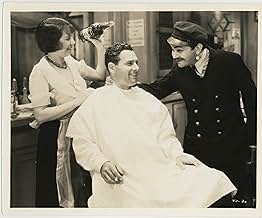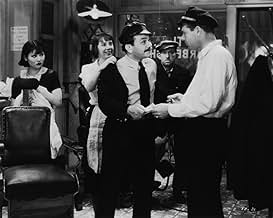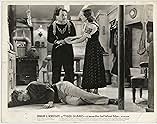IMDb-BEWERTUNG
6,3/10
1167
IHRE BEWERTUNG
Füge eine Handlung in deiner Sprache hinzuA tuna fisherman marries a woman who doesn't love him.A tuna fisherman marries a woman who doesn't love him.A tuna fisherman marries a woman who doesn't love him.
- Auszeichnungen
- 2 wins total
J. Carrol Naish
- Tony
- (as J. Carroll Naish)
Maurice Black
- Jean Fernandez - a Shipwrecked Crewman
- (Nicht genannt)
Sheila Bromley
- 'Red'
- (Nicht genannt)
Wong Chung
- Chinese Laundryman
- (Nicht genannt)
Edwin Maxwell
- Doctor
- (Nicht genannt)
Toshia Mori
- Oriental Lady Barber
- (Nicht genannt)
Henry Otho
- Crewman
- (Nicht genannt)
Inez Palange
- Mike's Neighbor
- (Nicht genannt)
Pedro Regas
- Crewman
- (Nicht genannt)
Joe Roig
- Undetermined Secondary Role
- (Nicht genannt)
Hector V. Sarno
- Crewman
- (Nicht genannt)
Harry Semels
- Crewman
- (Nicht genannt)
Empfohlene Bewertungen
Sorry, I forgot to add a point to my comment that was rather an important one, at least to me. Tiger Shark was shot in the early 1930s and there are some interesting scenes of men sailing their boat into a school of tuna, guided by a lookout, then lining up in the leads and pulling the fish in using flexible poles, one at a time. The scenes are authentic and exciting. Alas, they are history. Tuna fisherman now use "long lines." (Koreans and Japanese have huge industries built around this technique.) The fishing boat now needs a smaller crew (less expensive) because there no longer any mano a mano contests between fish and man. The crew simply strings out long fishing lines, guided by sonar, more than a mile long, with baited hooks fixed to the lines at short, regular intervals, set for a given depth. This has proved far more lucrative than fishing exclusively for tuna with poles. The long lines have a tendency to clean everything that swims out of the sea; not just tuna but sharks, sea turtles, porpoises, and game fish like marlin (which can't be legally sold). By the time they are harvested, many of the animals are already dead, especially the air-breathing turtles and porpoises. The industry has become much more efficient and without passion. Mike probably wouldn't have approved but the organization that would now own his boat would have.
Portuguese fisherman (Edward G. Robinson) loses a hand to a shark and later loses his young wife (Zita Johann) to his best friend (Richard Arlen). He doesn't like it. A simple plot that was reused by Warner Bros. many times over the years. It's an okay early film from Howard Hawks. Worth watching for Robinson's colorful performance. Eddie G's sporting an earring and a hook for a hand, folks. It's not Shakespeare but it's hard to look away. Real maritime footage is a plus. Classic horror fans will recognize Zita Johann from The Mummy, which was released this same year. She's a lot more subtle in this than in that film.
The plot of this film is nothing to write home about. Other reviewers have aptly summed it up as the quintessential love triangle. There are two things that make this film rise above 4 or 5 stars out of ten.
The first is the great footage of commercial fishing as it was practiced circa 1930. It really was man versus the sea back in those days. There is also some footage of how the fish is delivered and then processed once the fishing boat docks.
The second thing that makes this an interesting film is the odd combination of Edward G. Robinson on the way up, Richard Arlen on the way down, and Zita Johann in one of her few film appearances before she shrugged her shoulders and walked away from film after she decided she didn't need all the irritation she had to deal with as a Hollywood star.
Edward G. Robinson was a newcomer to talking films, having only one credited film appearance in silents, that being in 1916. Not a classicly good-looking man, he was fascinating to watch in almost any role because of his talent for drama as well as comedy. Richard Arlen was a great leading man over at Paramount, and even retained his position at that studio for a few years after sound came in. He had the looks, he had the voice, but his popularity fizzled nonetheless. Zita Johann does not have, as others have mentioned, a thick accent. Her diction is perfect, and she has exotic looks that can only be compared to Kay Francis.
Thus these three are thrown together in this film in exactly the way you'd believe them to be. Robinson as the likable fisherman, Mike, with a big heart who can't get a girl to love him because he is missing a hand that was taken by a shark. Zita Johann is the daughter of a fisherman on Mike's boat who falls overboard and is killed by a shark. Mike nurses her back to health - she is ill at the time her father dies - and takes care of her in general so that she feels beholden to marry him, plus she thinks she is through with love and feels that Mike will do as well as any man. Finally there is Arlen as Pipes, handsome friend of Mike. He and Mike's new wife fall in love but do not want to hurt someone that they feel has been very good to them.
There are two big problems with this plot. In execution, the problem is that we don't see any relationship build between Mike's wife and Pipes. She just announces to Pipes one night that she loves him and that is that. I realize there is not much room for character development in a 75 minute film, but they could have let this build a little bit. In concept, the whole fact that someone as likable as Mike would not be able to attract a woman just because he is missing a hand is a bit much. Women have not now nor have they ever been attracted to men just because of looks. Character counts a good deal more. This is a case of a man writing about women as though they were men.
In summary, if you run across this one it is always worthwhile to see Edward G. Robinson in action, but don't lose any sleep if it never comes your way.
The first is the great footage of commercial fishing as it was practiced circa 1930. It really was man versus the sea back in those days. There is also some footage of how the fish is delivered and then processed once the fishing boat docks.
The second thing that makes this an interesting film is the odd combination of Edward G. Robinson on the way up, Richard Arlen on the way down, and Zita Johann in one of her few film appearances before she shrugged her shoulders and walked away from film after she decided she didn't need all the irritation she had to deal with as a Hollywood star.
Edward G. Robinson was a newcomer to talking films, having only one credited film appearance in silents, that being in 1916. Not a classicly good-looking man, he was fascinating to watch in almost any role because of his talent for drama as well as comedy. Richard Arlen was a great leading man over at Paramount, and even retained his position at that studio for a few years after sound came in. He had the looks, he had the voice, but his popularity fizzled nonetheless. Zita Johann does not have, as others have mentioned, a thick accent. Her diction is perfect, and she has exotic looks that can only be compared to Kay Francis.
Thus these three are thrown together in this film in exactly the way you'd believe them to be. Robinson as the likable fisherman, Mike, with a big heart who can't get a girl to love him because he is missing a hand that was taken by a shark. Zita Johann is the daughter of a fisherman on Mike's boat who falls overboard and is killed by a shark. Mike nurses her back to health - she is ill at the time her father dies - and takes care of her in general so that she feels beholden to marry him, plus she thinks she is through with love and feels that Mike will do as well as any man. Finally there is Arlen as Pipes, handsome friend of Mike. He and Mike's new wife fall in love but do not want to hurt someone that they feel has been very good to them.
There are two big problems with this plot. In execution, the problem is that we don't see any relationship build between Mike's wife and Pipes. She just announces to Pipes one night that she loves him and that is that. I realize there is not much room for character development in a 75 minute film, but they could have let this build a little bit. In concept, the whole fact that someone as likable as Mike would not be able to attract a woman just because he is missing a hand is a bit much. Women have not now nor have they ever been attracted to men just because of looks. Character counts a good deal more. This is a case of a man writing about women as though they were men.
In summary, if you run across this one it is always worthwhile to see Edward G. Robinson in action, but don't lose any sleep if it never comes your way.
Edward G. Robinson is Mike, a Portugese immigrant who makes his living as a fisherman in "Tiger Shark," a 1932 movie also starring Richard Arlen and Zita Johann. Mike loses his hand while trying to save Quita's (Johann's) father from a shark, but he does manage to save his buddy Pipes. He falls in love with Quita when they meet, and, seeing that she is alone, he eventually proposes. She accepts but says that she does not love him. He apparently doesn't notice that one of his mates, Pipes,(Richard Arlen) has a crush on Quita, so Pipes is around a lot.
This is a very dated and movie with stiff performances from everyone but Robinson. The character of Mike is very stereotypical now, but probably wasn't back then - the paunchy immigrant, kind of dumb, with false bravado, and don't forget about the hook for a hand. Very similar to "They Knew What They Wanted." There are endless scenes of fishing, which these men did with poles and harpoons, not nets. It looked dangerous, and I guess if Quita's father died and Mike lost his hand, it was.
The pretty Roumanian actress Zita Johann, who was married to John Houseman, is effective as Mike's shy, young and grateful bride - but after she spots handsome Pipes, she realizes gratitude can only take one so far. Here she's dressed plainly with little makeup - but one can see that with the Dorothy Lamour treatment, she probably looked very exotic. Arlen, of "Wings" fame, is pretty hunky. He died in 1978 and worked practically until his last breath, giving him a career span of 57 years. His heyday, however, was in the silent era.
Edward G. Robinson is excellent as always, but the film just doesn't hold up today. Robinson proved early on that he could do just about anything, though in the '30s, he was most often cast as a thug. When you see Mike in action toward the end of the movie, you'll realize this role isn't that far from what he did as Little Caesar.
I can't really recommend this unless you're interested in fishing circa 1932.
This is a very dated and movie with stiff performances from everyone but Robinson. The character of Mike is very stereotypical now, but probably wasn't back then - the paunchy immigrant, kind of dumb, with false bravado, and don't forget about the hook for a hand. Very similar to "They Knew What They Wanted." There are endless scenes of fishing, which these men did with poles and harpoons, not nets. It looked dangerous, and I guess if Quita's father died and Mike lost his hand, it was.
The pretty Roumanian actress Zita Johann, who was married to John Houseman, is effective as Mike's shy, young and grateful bride - but after she spots handsome Pipes, she realizes gratitude can only take one so far. Here she's dressed plainly with little makeup - but one can see that with the Dorothy Lamour treatment, she probably looked very exotic. Arlen, of "Wings" fame, is pretty hunky. He died in 1978 and worked practically until his last breath, giving him a career span of 57 years. His heyday, however, was in the silent era.
Edward G. Robinson is excellent as always, but the film just doesn't hold up today. Robinson proved early on that he could do just about anything, though in the '30s, he was most often cast as a thug. When you see Mike in action toward the end of the movie, you'll realize this role isn't that far from what he did as Little Caesar.
I can't really recommend this unless you're interested in fishing circa 1932.
Tiger Shark (1932)
*** (out of 4)
A lonely fisherman (Edward G. Robinson) marries a girl out of pity only to see her fall in love with his best friend. Director Howard Hawks does a very good job at showing off a wide range of emotions from sentiment to laughs to some very intense shark attack scenes. Robinson clearly steals the show with his touching performance but the supporting roles are good too. Another highlight is seeing the old time assembly line of having the fish removed from the boat and cleaned all in the matter of minutes. Apparently Warner loved this story so much that they remade it three times within the next ten years including Robinson returning in Manpower.!!!
*** (out of 4)
A lonely fisherman (Edward G. Robinson) marries a girl out of pity only to see her fall in love with his best friend. Director Howard Hawks does a very good job at showing off a wide range of emotions from sentiment to laughs to some very intense shark attack scenes. Robinson clearly steals the show with his touching performance but the supporting roles are good too. Another highlight is seeing the old time assembly line of having the fish removed from the boat and cleaned all in the matter of minutes. Apparently Warner loved this story so much that they remade it three times within the next ten years including Robinson returning in Manpower.!!!
Wusstest du schon
- WissenswertesQuita wears traditional Portuguese attire for her wedding.
- PatzerWhen Quita tells Mike to leave her alone after being informed of her father's death, he responds twice with "yeah, all right". But Robinson as Mike drops the Portuguese accent he uses for the role and uses a regular American accent.
- Crazy CreditsOpening Card: San Diego
- VerbindungenFeatured in Sharksploitation (2023)
- SoundtracksAbdulla Bulbul Amir
(1877) (uncredited)
Written by William Percy French
Sung by Richard Arlen and members of the crew
Top-Auswahl
Melde dich zum Bewerten an und greife auf die Watchlist für personalisierte Empfehlungen zu.
Details
- Laufzeit1 Stunde 17 Minuten
- Farbe
- Sound-Mix
- Seitenverhältnis
- 1.37 : 1
Zu dieser Seite beitragen
Bearbeitung vorschlagen oder fehlenden Inhalt hinzufügen





































